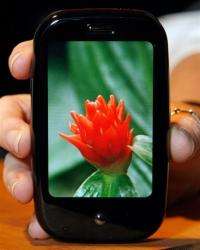Pre likely to make a splash, but can new smartphone rescue Palm?

The new Pre smartphone from Palm is likely to make a splash when it goes on sale this Saturday, but will that be enough to turn things around for the struggling Silicon Valley company?
"There's everything riding on this," said Jack Gold, a wireless industry analyst. "If they don't have a winning product here, they're not likely to get a second chance."
Early reviews suggest the Pre may stand up well against Apple's iPhone, thanks to a design that combines both a touch screen and a keyboard with a new operating system that promises to let users run multiple applications at the same time, while quickly accessing Twitter, Facebook and other popular Web-based services.
But as Palm has painfully learned -- with the dwindling popularity of its once pioneering Pilot personal digital devices -- one flashy new product is no guarantee of long-term success. The Sunnyvale, Calif., company, which has been losing money for nearly two years, has been criticized for poor follow-through on other new releases.
Now, industry experts say Palm must get ahead of the curve and stay there, with updated software and a series of successful products, if it wants to remain competitive for the long term.
"It's very important for Palm to go the next step, beyond the Pre," warned Trip Chowdhry, a veteran tech analyst with Global Equities Research.
In the days leading up to the Pre's launch, company officials have acknowledged the need for a new approach.
"We hired a lot of new people. We've completely revamped the company," executive chairman Jon Rubinstein, a former Apple exec who was recruited by investors to help turn Palm around, told an audience last week. And he stressed that the crucial element for the Pre is its new software, including an operating system called webOS that Palm hopes will be the platform for future products.
Apple is also planning to unveil new software for its iPhone on Monday. And despite some highly publicized boasting this spring by Palm board member Roger McNamee, who predicted that iPhone owners would defect to the Pre in droves, Palm officials are now saying they don't expect to drive either Apple or Research in Motion, maker of the popular BlackBerry, out of the phone business.
Palm declined to make a spokesman available this week. But joining Rubinstein last week at the "D: All Things Digital" conference sponsored by the Wall Street Journal, McNamee noted that the two market leaders are meeting only a small share of growing consumer demand.
"There's a lot of white space that Palm could step into," said McNamee, who is also managing director of Elevation Partners, which became Palm's biggest investor by pouring $425 million into the company in recent years.
The competitive reasoning makes sense, according to Tim Bajarin of the Creative Strategies tech consulting firm. While consumers around the world bought 1 billion mobile phones last year, he said, only 10 percent of them were smartphones. Bajarin estimates that will grow to 60 percent in the next three years, leaving plenty of room for Palm.
Palm says the Pre will sell for $200 after a rebate and a two-year service contract from Sprint, which has exclusive rights for the rest of the year. Verizon has said it also expects to offer the phone in 2010.
But there's no denying Palm needs a home run. The company has reported losses for the past seven quarters. Sales were down 70 percent for its most recent three-month fiscal period, as Palm struggled with dwindling orders for its older products and shipping delays for a newer phone, the Treo Pro.
Palm's stock, which had sunk to $1.14 in December, had climbed to $13.21 this week as investors bet on a hit with the Pre. It dropped to $12.49 Wednesday after BusinessWeek published a critical review that suggested Palm is "teetering on the brink of extinction."
"It's a must-win situation," said Gold, president of J.Gold Associates. But he agreed the Pre alone won't change the game for Palm:
"What they're betting on is not just the Pre," he said. "It's the webOS" -- the operating system Palm created for the Pre and other products. Palm has been phasing out its old operating system; its Treo phone now runs on Windows Mobile.
The field is crowded, with Microsoft, Apple, Google, Nokia and RIM already promoting their own operating systems for phones. While some question if there is room for one more, Bajarin described webOS as "brilliant," in part because it was designed to work with popular software development tools, so independent developers can easily create new Web applications for the Pre.
Palm is planning an App Catalog for the Pre, modeled after the highly successful App Store that Apple created for the iPhone.
Chowdhry said his industry sources believe Palm also is working on a new netbook that will use the operating system. He's convinced the company has a viable long-term strategy, although he warned that much of it depends on Rubinstein's continued involvement.
Other analysts said they expect Palm to focus on developing additional phones, rather than netbooks.
Even a "modest" success with the Pre will help Palm in the short run, according to Ross Rubin of the NPD research group. "The question is around the long term. It's a very competitive environment. Palm has to invest in the R&D to continue to advance the platform."
___
(c) 2009, San Jose Mercury News (San Jose, Calif.).
Visit MercuryNews.com, the World Wide Web site of the Mercury News, at www.mercurynews.com
Distributed by McClatchy-Tribune Information Services.



















